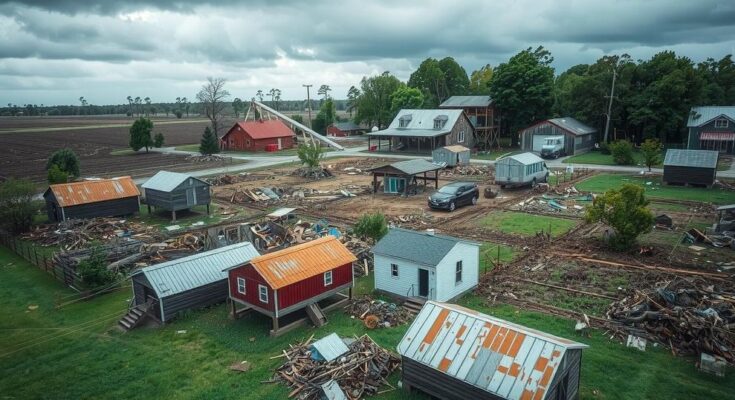Farmers in Georgia and the South continue to face severe challenges months after Hurricane Helene, which significantly impacted crops, resulting in over $10 billion in estimated damages. Many farmers experienced emotional and financial strain while contemplating their futures following extensive damage. Emergency relief efforts have been initiated, though the recovery process will be long and difficult for affected agricultural communities.
Farmers in the South, particularly in Georgia, are facing significant challenges more than two months after Hurricane Helene wreaked havoc on their crops. The storm hit on September 26 as a powerful Category 4 hurricane, causing extensive damage to cotton, pecans, and vegetables while also destroying farm equipment. Chris Hopkins, a Georgia farmer, described the emotional toll, contemplating whether to continue or rebuild after enduring immense losses. The aftermath has led to estimated damages exceeding $10 billion across affected states, with Georgia itself suffering at least $5.5 billion in losses alone.
The storm’s impact was particularly devastating for farmers during the critical fall harvest, with many losing half of their cotton yield. Fields and orchards were stripped bare as crops awaited harvest, resulting in an overwhelming amount of debris for farmers to clear. Even those who were relatively distant from the storm’s core felt its wrath, as tropical-storm-force winds extended up to 310 miles from the center. Timothy Coolong, a horticulture professor, remarked on the staggering impact, indicating this level of devastation could be insurmountable for some farmers.
In response to the disaster, the Georgia government reallocated $100 million from various projects to support emergency loans for farmers in need. However, state regulations complicate direct financial aid to individuals and private enterprises. Furthermore, federal legislation is envisioned to provide additional aid to farmers. Jeffrey Pridgen, a farmer affected by the storm, emphasized the urgency of such assistance, as his poultry operations have been drastically reduced due to the destruction of multiple chicken houses.
The poultry sector alone in Georgia saw damages estimated at $683 million, necessitating the rebuilding of numerous production facilities. Mike Giles, of the Georgia Poultry Federation, noted that the processing facilities that depend on these farmers are now operating at reduced capacity. While experts believe the overall consumer prices may remain stable due to adequate supply from other regions, the exceptional nature of pecan production in Georgia could be an exception affecting market prices. Despite the catastrophic loss, the resilience of farmers is evident, and they are now focused on navigating the arduous recovery process.
Hurricane Helene struck the southeastern United States in September 2023 as a significant Category 4 storm, with far-reaching effects on agriculture. The storm caused widespread devastation to crops and infrastructure across states from Florida to Virginia. Many farmers in Georgia were particularly impacted, experiencing substantial financial losses at a critical juncture for their agricultural operations. The disaster highlighted the vulnerability of farmers to extreme weather events, exacerbated by existing economic challenges within the agricultural sector. Relief measures, both state and federal, were mandated to address the ongoing needs of the devastated agricultural community.
In conclusion, Hurricane Helene has left a profound impact on farmers in the South, specifically in Georgia, where many are grappling with the aftermath of unprecedented losses. The estimated damages from the storm exceed $10 billion across affected states, with significant contributions from agricultural sectors struggling to rebound. Relief efforts have commenced, yet the emotional and financial toll remains daunting for many. As farmers seek both recovery and resilience, the ongoing support from state and federal resources will be essential in rebuilding their livelihoods.
Original Source: abcnews.go.com




